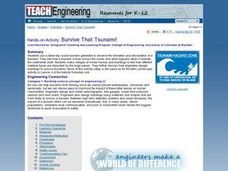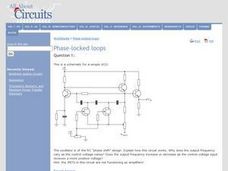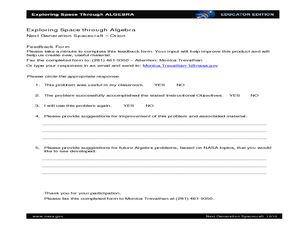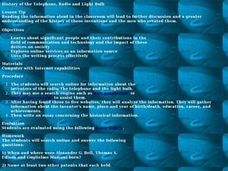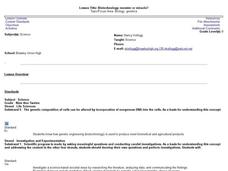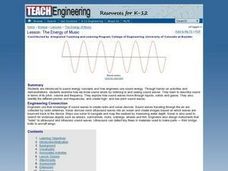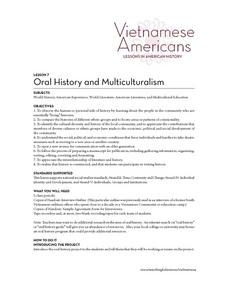Curated OER
TE Activity: Survive That Tsunami!
Students examine the causes of tsunamis and observe a table top wave making machine. They make model houses while working in groups so that the can see how different construction types work. They discuss how engineers can design and...
Curated OER
Phase-locked Loops
In this physics instructional activity, students examine how phase-locked loop circuits works and answer 8 short answer questions about it. They explain how FM radio communication works.
NASA
Next Generation Spacecraft - Orion
Emergine space engineers discover the area of complex geometric shapes. They find that, just as a spacecraft is composed of many smaller parts, so can polygons be broken into smaller shapes.
Teach Engineering
See the Genes
"If you can't explain it simply, you don't understand it well enough" - Albert Einstein. The sixth installment of a seven-part series teaches young scientists about the importance of being able to communicate scientific research and...
University of Minnesota
Virtual Neurons
It's electric! Young anatomists use Virtual Neurons software to build, control, and analyze complex nerve circuits within the body. Colorful and packed with content, class members enjoy interacting with the nervous system at a personal...
BBC
Getting Online One Click at a Time
The Internet is a vast and fascinating place to be, but you have to know how to get there first! Use a helpful guide to become computer savvy in no time. It covers computer basics such as keyboarding and hardware, and goes into e-mail,...
National Sailing Hall of Fame
Introduction to Sailboats
The left part of the boat is called what? An informative instructional activity and accompanying slideshow presentation introduce middle schoolers to the terminology and parts associated with a sailboat.
Curated OER
Keep In Touch: Communications and Satellites
Fourth graders explore communications by reading assigned space science text. In this satellite lesson, 4th graders identify the concept of orbiting and examine gravitational pull by viewing diagrams. Students are assessed based on...
Curated OER
Cross-Cultural Exploration
Students in an ESL classroom identify and locate the states on a United States map. Using the internet, they research to compare the holidays in their home country and the United States. They share their findings in an email to...
Curated OER
History of the Telephone, Radio, and Light Bulb
Students research and discuss the history of the telephone, radio, and light bulb. In this invention history lesson, students access Internet sites to explore the inventors and the invention of the telephone, the radio, and the light...
Curated OER
Who's Listening?
Students identify nonverbal signs of attention, and demonstrate skills for interacting with others.
Curated OER
Does the falling tree make a sound if no one if there to hear it? (or communication via encryption)
Students explore encryption. They discuss the importance of cryptography in our daily lives. Students use games and cryptography to discover transformational geometry and modulo systems. They design their own encryption puzzles and...
Curated OER
Unlocking the Endocrine System
Fifth graders use an analogy to the mail delivery system to study the workings of the human endocrine system. They discover the interrelationships between the human body systems while comparing them to engineering communicating with...
Curated OER
Biotechnology: Monster or Miracle
Students explore biotechnology. For this scenario-based lesson, students take a survey on what they know about genetic engineering, view a PowerPoint, and conduct a web quest. Students will then be placed in groups, and produce one of...
Curated OER
The Energy of Music
Students discover how engineers use sound energy. They participate in hands-on activities in which they discover how we know sound exists. They identify different pitches and frequencies as well.
Curated OER
Find It!
Students analyze the basic concept of Global Positioning Systems using triangulation and measurement on a small scale in the classroom. They describe a satellite and how it helps in locating a person on Earth. They explain how...
Curated OER
Cruising the Internet
Students identify the parts of an engine using a graph. In this statistics lesson, students make a graph from their collected data. They calculate the volume of a cylinder using a line of regression and a scatter plot.
Curated OER
Forces in a Climb
Students use a NASA website to use a given formula to find acceleration and distance after a specific time and how it relates to engine propulsion.
Curated OER
TSA Chapter Team (Written & Oral)
Students identify and describe how technology is how humans modify the world around them to meet their needs and wants or to solve problems and extend their capability. They also identify how communication, electrical, fluid,...
Curated OER
Oral History and Multiculturalism
Students observe the human or personal side of history by assessing the background to the people in the community who are basically "living" historians. They compare the histories of different ethnic groups to identify areas of patterns...
Curated OER
Learning from Letters and Other Mail
Students explore the history of our mail system. In this postal lesson plan, students evaluate mail as a means of communication, create a mail system in their classroom where they can send and receive mail. Once the students receive...
Teach Engineering
How a Hybrid Works
Work with your class to connect series and parallel circuits to hybrid cars. The lesson introduces basic circuit diagrams before having scholars apply the understanding of the difference between parallel and series circuits to hybrid cars.
Curated OER
Ooblek
Students demonstrate the three states of matter. In this matter instructional activity, students read Bartholomew and the Ooblek. Students create "ooblek" and discuss what state of matter it is.
Curated OER
Strawkets and Control
Students investigate the effect that fins have on rocket flight. They construct two paper rockets that they can launch by blowing through a straw, one with fins and one with wings, and observe and record the results of the rocket flights.


